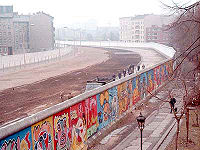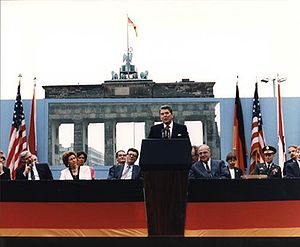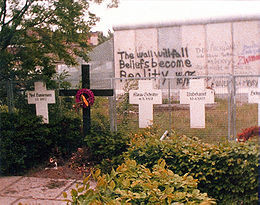- Tear down this wall!
-
"Tear down this wall!" was the challenge from United States President Ronald Reagan to Soviet leader Mikhail Gorbachev to destroy the Berlin Wall.
In a speech at the Brandenburg Gate near the Berlin Wall on June 12, 1987, commemorating the 750th anniversary of Berlin,[1][2] Reagan challenged Gorbachev (who was then the General Secretary of the Communist Party of the Soviet Union), to tear it down as a symbol of Gorbachev's desire for increasing freedom in the Eastern Bloc.
Contents
Background
Built in 1961, the Berlin Wall became known as a symbol of communism.[3] In the 1963 "Ich bin ein Berliner" speech, U.S. President John F. Kennedy stated the support of the United States for democratic West Germany shortly after the Soviet-supported Communist state of East Germany erected the Berlin Wall as a barrier to prevent movement from East to West.[4]
President Reagan's 1982 visit was his second within five years. It came at a time of heightened East-West tensions, caused in particular by the debate over the stationing of short range American missiles in Europe and the United States' record peacetime defense buildup.[5] Reagan was scheduled to attend the 1987 G-7 summit meeting in Venice, Italy, and later made a brief stop in Berlin.[6]
The Brandenburg Gate site was chosen to highlight the President's conviction that Western democracy offered the best hope to open the Berlin Wall.[2] His speech focused on a series of political initiatives to achieve this end. The famous "tear down this wall" phrase was intended as the logical conclusion of the President's proposals. As the speech was being drafted, inclusion of the words became a source of considerable controversy within the Reagan administration. Several senior staffers and aides adviriter]]s, including Peter Robinson, thought otherwise. Robinson traveled to West Germany to inspect potential speech venues, and gained an overall sense that the majority of West Berliners opposed the wall. Despite getting little support for suggesting Reagan demand the wall's removal, Robinson kept the phrase in the speech text. On May 18, 1987, President Reagan met with his speechwriters and responded to the speech by saying, "I thought it was a good, solid draft." Chief of Staff Howard Baker objected, saying it sounded "extreme" and "unpresidential," and Deputy National Security Advisor Colin Powell agreed. Nevertheless, Reagan liked the passage, saying, "I think we'll leave it in."[7]
The speech
Arriving in Berlin on June 12, 1987, President and Mrs. Reagan were taken to the Reichstag, where they viewed the wall from a balcony.[8] Reagan then made his speech at the Brandenburg Gate at 2:00 p.m., in front of two panes of bulletproof glass protecting him from potential snipers in East Berlin.[2] About 45,000 people were in attendance; among the spectators were West German president Richard von Weizsäcker, Chancellor Helmut Kohl, and West Berlin mayor Eberhard Diepgen.[8] That afternoon, Reagan said,
“ We welcome change and openness; for we believe that freedom and security go together, that the advance of human liberty can only strengthen the cause of world peace. There is one sign the Soviets can make that would be unmistakable, that would advance dramatically the cause of freedom and peace. General Secretary Gorbachev, if you seek peace, if you seek prosperity for the Soviet Union and eastern Europe, if you seek liberalization, come here to this gate. Mr. Gorbachev, open this gate. Mr. Gorbachev, Mr. Gorbachev, tear down this wall![9] ” Later on in his speech, President Reagan said, "As I looked out a moment ago from the Reichstag, that embodiment of German unity, I noticed words crudely spray-painted upon the wall, perhaps by a young Berliner, 'This wall will fall. Beliefs become reality.' Yes, across Europe, this wall will fall. For it cannot withstand faith; it cannot withstand truth. The wall cannot withstand freedom."[9]
Another highlight of the speech was Reagan's call to end the arms race with his reference to the Soviets' SS-20 nuclear weapons, and the possibility "not merely of limiting the growth of arms, but of eliminating, for the first time, an entire class of nuclear weapons from the face of the Earth."[2]
Response and legacy
Although it has been called "The four most famous words of Ronald Reagan's Presidency", the speech received "relatively little coverage from the media", Time magazine reported 20 years later.[10] Communists were critical of the speech,[1] and the Soviet press agency Tass accused Reagan as giving an "openly provocative, war-mongering speech."[2]
Twenty-nine months later, on November 9, 1989, after intense East German protest, East Germany finally opened the Berlin Wall. By the end of the year, official operations to dismantle the wall began. With the collapse of the Communist governments of Eastern Europe and, eventually, the Soviet Union itself, the tearing down of the wall epitomized the collapse for history. In September 1990, Reagan, no longer President, returned to Berlin, where he personally took a few symbolic hammer swings at a remnant of the Berlin Wall.[11]
Former West German Chancellor Helmut Kohl said he would never forget standing near Reagan when he challenged Gorbachev to tear down the Berlin Wall. "He was a stroke of luck for the world, especially for Europe."[12] Although there is some disagreement over how much influence Reagan's words had on the destruction of the wall, the speech is remembered as an important moment in Cold War history.[7]
References
- ^ a b "Reagan's 'tear down this wall' speech turns 20 - USATODAY.com". USA Today. 2007-06-12. http://www.usatoday.com/news/world/2007-06-12-reagan-speech_N.htm. Retrieved 2008-02-19.
- ^ a b c d e Boyd, Gerald M (June 13, 1987). "Raze Berlin Wall, Reagan Urges Soviet". The New York Times. http://query.nytimes.com/gst/fullpage.html?res=9B0DE3DC1F30F930A25755C0A961948260. Retrieved 2008-02-09.
- ^ "What the Berlin Wall still stands for". CNN Interactive. November 8, 1999. http://www.cnn.com/SPECIALS/views/y/1999/11/burns.wall.nov8. Retrieved 2008-02-18.
- ^ "John Fitzgerald Kennedy". Scholastic Library Publishing, Inc.. 2006. http://ap.grolier.com/article?assetid=atb023b11&templatename=/article/article.html. Retrieved 2008-02-16.
- ^ "The Cold War". Workstations at Delaware. http://www.wam.umd.edu/~jklumpp/comm461/cold.html. Retrieved 2008-02-08.
- ^ Mann, James (June 10, 2007). "Tear Down That Myth". The New York Times. http://www.nytimes.com/2007/06/10/opinion/10mann.html?pagewanted=print. Retrieved 2008-02-09.
- ^ a b Walsh, Kenneth T (June 2007). "Seizing the Moment". U.S. News & World Report: pp. 39–41. http://www.usnews.com/usnews/news/articles/070610/18speeches.htm. Retrieved 2007-06-27.
- ^ a b "Ronald Reagan's Famous "Tear Down This Wall" Speech Turns 20". German Embassy, Washington, DC. http://www.germany.info/relaunch/politics/new/pol_Reagan_Berlin_Anniv_2007.htm. Retrieved February 9, 2008.[dead link]
- ^ a b "Remarks on East-West Relations at the Brandenburg Gate in West Berlin". Ronald Reagan Presidential Library. http://www.reagan.utexas.edu/archives/speeches/1987/061287d.htm. Retrieved May 29, 2011.
- ^ Ratnesar, Romesh (2007-06-11). "20 Years After "Tear Down This Wall" - TIME". Time. http://www.time.com/time/world/article/0,8599,1631828,00.html. Retrieved 2008-02-19.
- ^ Douglas, Carlyle C (September 16, 1990). "Reagan Hailed for Taking the Evil Out Of The Empire". The New York Times. http://query.nytimes.com/gst/fullpage.html?res=9C0CE6DA163CF935A2575AC0A966958260&. Retrieved 2008-02-10.
- ^ Jason Keyser (June 7, 2004). "Reagan remembered worldwide for his role in ending Cold War division". USA Today. http://www.usatoday.com/news/world/2004-06-07-reagan-world_x.htm.
Further reading
- Robinson, Peter. It's My Party: A Republican's Messy Love Affair with the GOP. (2000), hardcover, Warner Books, ISBN 0-446-52665-7
- Ambassador John C. Kornblum: "Reagan's Brandenburg Concerto", The American Interest, May–June 2007
- Ratnesar, Romesh. "Tear Down This Wall: A City, a President, and the Speech that Ended the Cold War" (2009)
External links
- Full text and audio MP3 of the speech
- Full video of President Reagan delivering the speech at the Brandenburg Gate, courtesy of the Reagan Foundation.
- Reagan speechwriter Peter Robinson reflecting on the speech before the Commonwealth Club of California in 2004.
- Image of text at National Archives site
Ronald Reagan February 6, 1911 – June 5, 2004Life Presidency Domestic policy · Economic policy · Economic Recovery Tax Act of 1981 · Tax Reform Act of 1986 · Assassination attempt · Strategic Defense Initiative · Foreign policy · Reagan Doctrine · Cold War: first term, second term · Iran–Contra · Judicial appointmentsSpeeches Books Elections Family Nancy Davis Reagan (wife) · Jane Wyman (first wife) · Maureen Reagan Revell (daughter) · Michael Edward Reagan (son) · Patricia Reagan Davis (daughter) · Ronald Prescott "Ron" Reagan (son) · John "Jack" Reagan (father) · Nelle Wilson Reagan (mother) · Neil Reagan (brother)The Berlin Wall Main article 
Related articles Memorials, museums and galleries Crossings Berlin border crossings · Checkpoint Charlie · Checkpoint Bravo · Berlin Friedrichstraße station · Tränenpalast, Friedrichstrasse stationDeaths from breaching the Wall List of deaths at the Berlin Wall
Ida Siekmann · Günter Litfin · Marienetta Jirkowsky · Chris Gueffroy · Peter Fechter · Winfried Freudenberg · Heinz SokolowskiOther people connected to the Wall The Wall in speeches Ich bin ein Berliner · Tear down this wall!The Wall in popular culture The Tunnel (NBC documentary) · The Wall (1962 film) · The Tunnel (2001 film) · Good Bye, Lenin! · The Berlin Wall (video game) · "West of the Wall"Other List of Berlin Wall segments · Ghost stationCategories:- 1987 in Germany
- 1987 in politics
- 1987 works
- Berlin Wall
- Cold War speeches
- History of the foreign relations of the United States
- Anti-communism in the United States
- Anti-communism in Germany
- Political slogans
- Presidency of Ronald Reagan
- Germany–Soviet Union relations
- Soviet Union–United States relations
- Allied occupation of Germany
- History of Berlin
- West Germany
- Germany–United States relations
- Speeches by Ronald Reagan
- 1987 in international relations
Wikimedia Foundation. 2010.




